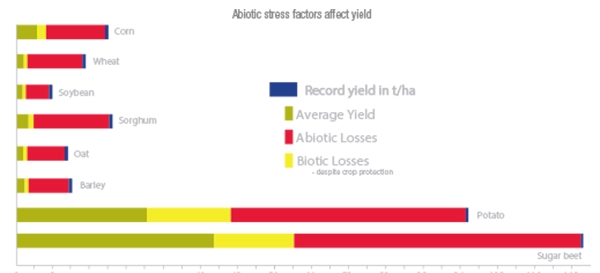
Features
Agronomy
Genetics/Traits
Seed treatment role in plant health
Optimizing plant health and minimizing plant stress increases yield potential and profitability in crop production. For all crops, including cereals, there are two principal stresses that impact plant health: biotic and abiotic.
Dr. Wolfgang Thielert, crop protection scientist with Bayer CropScience Inc. in Germany, explains that biotic stresses such as bacteria, fungi, viruses, pests and weeds are significant, but generally there are good crop protection tools, such as fungicides, insecticides and herbicides, available to deal with these stresses. Abiotic stresses, such as temperature stress, drought, water logging, soil salinity and other environmental factors can account for up to 70 per cent of the yield gap between record yields and average yield. However, there are limited tools, such as irrigation, to mitigate the impact of these stresses.
“Both abiotic and biotic stresses impact a plant cell’s physiological balance, reducing its ability to efficiently use the resources necessary for growth and yield development,” says Thielert. “When plants are subject to stress, sensing compounds within the cells signal them to divert valuable energy to prevent or repair stress damage, leaving less energy available for growth and yield production. Stressed plants produce fewer leaves, flowers and grain, which, in turn, leads to considerable losses in crop yields.”
Seed treatments are the first building block to achieve an even germination, high emergence rate and even crop stand, all prerequisites for efficient crop management and securing high yields and quality. “Seed treatments are among the first and foremost of crop protection products that control fungal and insect pests, and help optimize plant health and improve yields,” explains Kelly Patzer, cereals development manager, Bayer CropScience Inc., in Calgary, Alta. “However, broad spectrum cereal seed treatments like Raxil WW (which contains Stress Shield) or Raxil Pro Shield also have a second mode of action that works to mitigate the impact of abiotic and biotic stress on plant cells right from the beginning of crop establishment and therefore increase yield potential.”
This second mode of action works to mitigate the impact of abiotic and biotic stress on plant cells. It does this by triggering certain compounds and pathways in the plant, such as the salicylic acid pathway. “This stimulates activity in what is the closest thing a plant has to an immune system, boosting resistance to viruses, bacteria and fungi in a number of crops,” explains Thielert. “For example, the compound imidacloprid mitigates crop stress by delaying the reduction of photosynthesis and lowering the expression of drought marker genes under stress. This keeps the energy production going and reduces canopy decline under stress. It also triggers the expression of pathogenesis-related (PR) proteins. Imidacloprid triggers the highest and fastest expression of PR proteins among the neonic insecticides.”
Tebuconazole and prothioconazole (the active ingredients in Raxil Pro and Prosaro) also produce plant health effects beyond fungicidal activity alone. In a seed treatment application, these compounds inhibit gibberellic acid synthesis and shorten the subcrown internode in cereals. This improves frost tolerance by lowering the crown in the soil profile, providing greater protection from freezing temperatures. It also increases shoot stem diameter and root length, leading to improved seed vigour, plant stand and nutrient access. Salicylic acid production is increased, which prolongs transpiration and growth under stress and enhances disease resistance through the stimulation of PR protein production. Thielert stresses it is important to realize that plant health compounds do not provide stress immunity but a level of stress tolerance that helps the plant minimize the negative effects during a transient sublethal stress period and recover and resume optimal growth quicker after the stress has been relieved.
Bayer has conducted research with Raxil WW and Raxil Pro both in controlled conditions and in field trials to evaluate this second mode of action. “We have had the ability to conduct evaluations both in the lab and in trials in the field in the absence of pest pressure, and the results show there is still a clear and definable yield benefit,” adds Patzer. “Relieving abiotic stresses by stimulating the plant’s own built-in defense system mechanism helps growers increase the efficiency of crop production. This means growers are able to get higher yields and quality out of the same resource use (such as fuel and fertilizer), which is a true increase in efficiency. This is a win-win for growers with obvious benefits also for the environment.”
There are similar benefits for plant health from foliar fungicides used for control of leaf and head diseases in cereals. Foliar fungicides such as Prosaro provide yield increase benefits outside of the benefits provided by controlling disease. “Using tools and techniques such as NDVI measurements and Greenseeker Technology, we have been able to measure the effect of products such as foliar fungicides on crops,” explains Patzer. “From our measurements, we have been able to demonstrate increased efficiency of photosynthesis, increased chlorophyll content and increased leaf area in the absence of disease pressure, all resulting in greater yield potential.”
Patzer adds that seed treatments and fungicides should be used first and foremost for the crop protection benefits they provide. However, when growers select crop protection products, using the particular active ingredients in Stress Shield and Raxil Pro for example, will provide additional plant health benefits that increase a crop’s yield potential and have a positive influence on the bottom line. “Comparing the benefits of a seed treatment in relation to the potential risk of yield and quality losses without, seed treatments are a ‘must’ for efficient crop management. Not only do growers get a yield increase from disease and insect control, but also additional benefits due to the plant health benefit of these materials.”
January 23, 2014 By Donna Fleury
 Abiotic stresses Optimizing plant health and minimizing plant stress increases yield potential and profitability in crop production.
Abiotic stresses Optimizing plant health and minimizing plant stress increases yield potential and profitability in crop production.